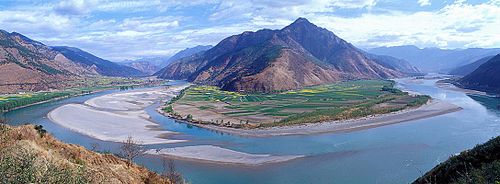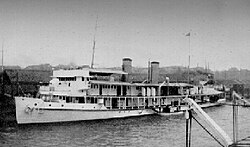Yangtze River


The Yangtze River, or Yangzi (Simple Chinese: 扬子江 / Traditional Chinese: 揚子江), or Chang Jiang (Simple Chinese: 长江 / Traditional Chinese: 長江), is the longest River in China and Asia, as well as the world's third longest river (after the Amazon and the Nile). It is honored as one of the two main cradles of Chinese civilization. (another is Yellow River)
The river is about 3,900 miles long and is one of the busiest waterways in the world. It goes from the western part of China (Plateau of Tibet) into the East China Sea, which is part of the Pacific Ocean. It has been thought of as a dividing point between northern and southern China. It helped start the Chinese civilization.
On the river is a big dam called the Three Gorges Dam, which is the biggest in the world.[1] It forms a man-made lake that stretches almost 410 miles (660 km) upstream.
The Yangtze River is home to many species. The Finless porpoise is endangered and the Lipotes vexillifer (Chinese river dolphin) which died in 2002.[2]
Top tourist attractions for the Yangtze river cruise are Chongqing Dazu Carvings, Three Gorges, lesser Three Gorges, Bai Di City, Fengdu Ghost City and so on.
The Yangtze River is also known as the Yanugzi or Chang Jiange.
Etymology: "The name Yangtze" [... comes] from the name of the ancient fiefdom of Yang", according to media.[3]
Uses
- transport
- drinking water
- cleaning
- boundary marking
- ingredients for food
Pollution
The Yangtze river is becoming extremely polluted.[4] The Yangtze river contains oil, dead animals and rubbish including cans, bags, wrappers, glass and plastic bottles. In 2001 about 23.4 billion tons of sewerage and factory waste was dumped in the river.[4]
Yangtze River Media
The "Great River" (大江) with its entrance to the East China Sea marked as the "Mouth of the Yangtze" (揚子江口) on the Jiangnan map in the 1754 Provincial Atlas of the Qing Empire
A map of the Warring States around 350 BC, showing the former coastline of the Yangtze delta
Yangtze River steam boats filmed in 1937
References
- ↑ Three Gorges Dam on Yangtze River: Facts, Site, Layout, Records: Three Gorges Dam on Yangtze River: Facts, Site, Layout, Records, accessdate: December 18, 2017
- ↑ https://www.marinebio.org/species/yangtze-river-dolphins/lipotes-vexillifer/
- ↑ Britannica.com/place/Yangtze-River. Retrieved 2024-01-28
- ↑ 4.0 4.1 New Scientist: Yangtze River pollution at dangerous levels | New Scientist, accessdate: December 18, 2017
Other websites
- [how to say Chiang Jiang]. https://upload.wikimedia.org/wikipedia/commons/transcoded/0/03/Zh-Ch%C3%A1ngji%C4%81ng.oga/Zh-Ch%C3%A1ngji%C4%81ng.oga.mp3. Wikimedia.org
- Attractions along Yangtze River
- Yangtze River Cruise Guide Archived 2014-01-16 at the Wayback Machine






